Deck 6: Power, Polynomial, and Rational Functions
Question
Question
Question
Question
Question
Question
Question
Question
Question
Question
Question
Question
Question
Question
Question
Question
Question
Question
Question
Question
Question
Question
Question
Question
Question
Question
Question
Question
Question
Question
Question
Question
Question
Question
Question
Question
Question
Question
Question
Question
Question
Question
Question
Question
Question
Question
Question
Question
Question
Question
Question
Question
Question
Question
Question
Question
Question
Question
Question
Question
Question
Question
Question
Question
Question
Question
Question
Question
Question
Question
Question

Unlock Deck
Sign up to unlock the cards in this deck!
Unlock Deck
Unlock Deck
1/71
Play
Full screen (f)
Deck 6: Power, Polynomial, and Rational Functions
1
If  and
and  , find
, find  .
.
A)
B)
C)
D)
E)
 and
and  , find
, find  .
.A)

B)

C)

D)

E)


2
Use the table below to find . 
A) -27
B) -1
C) -36
D) -12
E) 12

A) -27
B) -1
C) -36
D) -12
E) 12
12
3
If the rational function  has the vertical asymptote
has the vertical asymptote  , then as
, then as  ,
,  also.
also.
 has the vertical asymptote
has the vertical asymptote  , then as
, then as  ,
,  also.
also.False
4
If  and
and  , find
, find  .
.
A)
B)
C)
D)
E)
 and
and  , find
, find  .
.A)

B)

C)

D)

E)


Unlock Deck
Unlock for access to all 71 flashcards in this deck.
Unlock Deck
k this deck
5
For values of  , the function
, the function  grows faster than the function
grows faster than the function  .
.
 , the function
, the function  grows faster than the function
grows faster than the function  .
.
Unlock Deck
Unlock for access to all 71 flashcards in this deck.
Unlock Deck
k this deck
6
Use the graph below to find  .
. 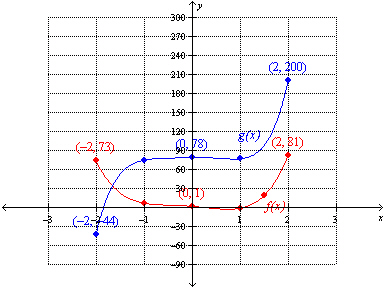
A) -2
B) 73
C) -0.6
D) -3212
E) -44
 .
. 
A) -2
B) 73
C) -0.6
D) -3212
E) -44

Unlock Deck
Unlock for access to all 71 flashcards in this deck.
Unlock Deck
k this deck
7
Use the table below to find . 
A) -39
B)
C)
D) -380
E)

A) -39
B)

C)

D) -380
E)


Unlock Deck
Unlock for access to all 71 flashcards in this deck.
Unlock Deck
k this deck
8
If  and
and  , find the domain of
, find the domain of  .
.
A)
B)
C)
D)
E)
 and
and  , find the domain of
, find the domain of  .
.A)

B)

C)

D)

E)


Unlock Deck
Unlock for access to all 71 flashcards in this deck.
Unlock Deck
k this deck
9
Use the graph below to find  .
. 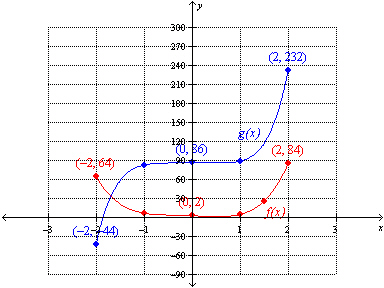
A) 232
B) 316.0
C) 84
D) 2
E) 2.8
 .
. 
A) 232
B) 316.0
C) 84
D) 2
E) 2.8

Unlock Deck
Unlock for access to all 71 flashcards in this deck.
Unlock Deck
k this deck
10
If  and
and  , find the domain of
, find the domain of  .
.
A)
B)
C)
D)
E)
 and
and  , find the domain of
, find the domain of  .
.A)

B)

C)

D)

E)


Unlock Deck
Unlock for access to all 71 flashcards in this deck.
Unlock Deck
k this deck
11
Use the table below to find . 
A) -16
B) 24
C) 10
D) -6
E) -2

A) -16
B) 24
C) 10
D) -6
E) -2

Unlock Deck
Unlock for access to all 71 flashcards in this deck.
Unlock Deck
k this deck
12
If  and
and  , find
, find  .
.
A)
B)
C)
D)
E)
 and
and  , find
, find  .
.A)

B)

C)

D)

E)


Unlock Deck
Unlock for access to all 71 flashcards in this deck.
Unlock Deck
k this deck
13
If  and
and  , find
, find  .
.
A) Undefined
B)
C)
D)
E)
 and
and  , find
, find  .
.A) Undefined
B)

C)

D)

E)


Unlock Deck
Unlock for access to all 71 flashcards in this deck.
Unlock Deck
k this deck
14
Use the graph below to find  .
. 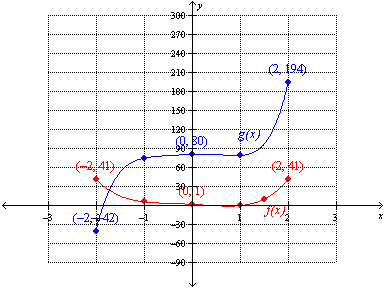
A) -42
B) 83
C) -2
D) 41
E) -1
 .
. 
A) -42
B) 83
C) -2
D) 41
E) -1

Unlock Deck
Unlock for access to all 71 flashcards in this deck.
Unlock Deck
k this deck
15
If  and
and  , find
, find  .
.
A)
B)
C)
D)
E)
 and
and  , find
, find  .
.A)

B)

C)

D)

E)


Unlock Deck
Unlock for access to all 71 flashcards in this deck.
Unlock Deck
k this deck
16
The graph of  is similar to the graph of
is similar to the graph of  .
.
 is similar to the graph of
is similar to the graph of  .
.
Unlock Deck
Unlock for access to all 71 flashcards in this deck.
Unlock Deck
k this deck
17
Use the graph below to find an approximation of  .
. 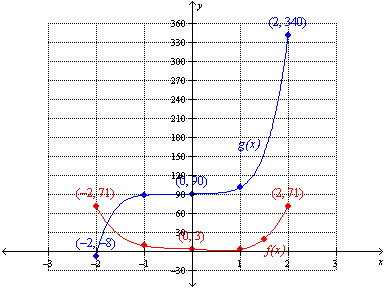
A) -8
B) 63
C) -2
D) 71
E) 79
 .
. 
A) -8
B) 63
C) -2
D) 71
E) 79

Unlock Deck
Unlock for access to all 71 flashcards in this deck.
Unlock Deck
k this deck
18
If  and
and  , find the domain of
, find the domain of  .
.
A)
B) 0
C)
D)
E)
 and
and  , find the domain of
, find the domain of  .
.A)

B) 0
C)

D)

E)


Unlock Deck
Unlock for access to all 71 flashcards in this deck.
Unlock Deck
k this deck
19
The function  exhibits the following end behavior:
exhibits the following end behavior:  and
and  .
.
 exhibits the following end behavior:
exhibits the following end behavior:  and
and  .
.
Unlock Deck
Unlock for access to all 71 flashcards in this deck.
Unlock Deck
k this deck
20
Use the table below to find . 
A) -117
B) 54
C) 162
D) -3
E) 15

A) -117
B) 54
C) 162
D) -3
E) 15

Unlock Deck
Unlock for access to all 71 flashcards in this deck.
Unlock Deck
k this deck
21
The mouse population in a small desert area is modeled by the function  where
where  is measured in days. When is the maximum population attained and what is the maximum population?
is measured in days. When is the maximum population attained and what is the maximum population?
A) After 175 days, the mouse population is 0.
B) After 9 days, the mouse population is 1,310.
C) After 84 days, the mouse population is 1,310.
D) After 84 days, the mouse population is 7,005.
E) After 9 days, the mouse population is 2,485.
 where
where  is measured in days. When is the maximum population attained and what is the maximum population?
is measured in days. When is the maximum population attained and what is the maximum population?A) After 175 days, the mouse population is 0.
B) After 9 days, the mouse population is 1,310.
C) After 84 days, the mouse population is 1,310.
D) After 84 days, the mouse population is 7,005.
E) After 9 days, the mouse population is 2,485.

Unlock Deck
Unlock for access to all 71 flashcards in this deck.
Unlock Deck
k this deck
22
Which one of the following graphs represents the function  ?
?
A)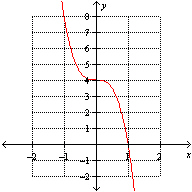
B)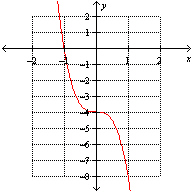
C) None of these options
D)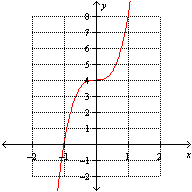
E)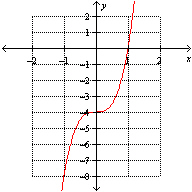
 ?
?A)

B)

C) None of these options
D)

E)


Unlock Deck
Unlock for access to all 71 flashcards in this deck.
Unlock Deck
k this deck
23
Let  and
and  . Find
. Find  .
.
A)
B) -4
C) -14
D) 30
E) -176
 and
and  . Find
. Find  .
.A)

B) -4
C) -14
D) 30
E) -176

Unlock Deck
Unlock for access to all 71 flashcards in this deck.
Unlock Deck
k this deck
24
Suppose that  is directly proportional to the 5th power of
is directly proportional to the 5th power of  . Which one of the following equations expresses this proportionality? .
. Which one of the following equations expresses this proportionality? .
A)
B)
C)
D)
E)
 is directly proportional to the 5th power of
is directly proportional to the 5th power of  . Which one of the following equations expresses this proportionality? .
. Which one of the following equations expresses this proportionality? .A)

B)

C)

D)

E)


Unlock Deck
Unlock for access to all 71 flashcards in this deck.
Unlock Deck
k this deck
25
Suppose that  is directly proportional to the 4th power of
is directly proportional to the 4th power of  . If it is known that
. If it is known that  when
when  , find the proportionality constant. Round to the nearest hundredth.
, find the proportionality constant. Round to the nearest hundredth.
A)
B)
C)
D)
E)
 is directly proportional to the 4th power of
is directly proportional to the 4th power of  . If it is known that
. If it is known that  when
when  , find the proportionality constant. Round to the nearest hundredth.
, find the proportionality constant. Round to the nearest hundredth.A)

B)

C)

D)

E)


Unlock Deck
Unlock for access to all 71 flashcards in this deck.
Unlock Deck
k this deck
26
The stopping distance  of a car after the brakes have been applied is directly proportional to the square of the speed
of a car after the brakes have been applied is directly proportional to the square of the speed  . The stopping distance of a car on dry asphalt is given by the function
. The stopping distance of a car on dry asphalt is given by the function  , where
, where  is measured in mi/h. Which one of the following is the inverse function of
is measured in mi/h. Which one of the following is the inverse function of  ?
?
A)
B)
C)
D)
E)
 of a car after the brakes have been applied is directly proportional to the square of the speed
of a car after the brakes have been applied is directly proportional to the square of the speed  . The stopping distance of a car on dry asphalt is given by the function
. The stopping distance of a car on dry asphalt is given by the function  , where
, where  is measured in mi/h. Which one of the following is the inverse function of
is measured in mi/h. Which one of the following is the inverse function of  ?
?A)

B)

C)

D)

E)


Unlock Deck
Unlock for access to all 71 flashcards in this deck.
Unlock Deck
k this deck
27
The area of a circle with radius  is given by the power function
is given by the power function  . What happens to the area of the circle when the radius is multiplied by 3?
. What happens to the area of the circle when the radius is multiplied by 3?
A) The area increases by a factor of 9.
B) The area is also multiplied by 3.
C) The area increases by .
.
D) Not enough information.
E) The area increases by .
.
 is given by the power function
is given by the power function  . What happens to the area of the circle when the radius is multiplied by 3?
. What happens to the area of the circle when the radius is multiplied by 3?A) The area increases by a factor of 9.
B) The area is also multiplied by 3.
C) The area increases by
 .
.D) Not enough information.
E) The area increases by
 .
.
Unlock Deck
Unlock for access to all 71 flashcards in this deck.
Unlock Deck
k this deck
28
Determine the end behavior of the function  .
.
A) As and as
and as  .
.
B) As and as
and as  .
.
C) As and as
and as  .
.
D) As and as
and as  .
.
E) As and as
and as  .
.
 .
.A) As
 and as
and as  .
.B) As
 and as
and as  .
.C) As
 and as
and as  .
.D) As
 and as
and as  .
.E) As
 and as
and as  .
.
Unlock Deck
Unlock for access to all 71 flashcards in this deck.
Unlock Deck
k this deck
29
Suppose that  is directly proportional to the 6th root of
is directly proportional to the 6th root of  . Which one of the following equations expresses this proportionality?
. Which one of the following equations expresses this proportionality?
A)
B)
C)
D)
E)
 is directly proportional to the 6th root of
is directly proportional to the 6th root of  . Which one of the following equations expresses this proportionality?
. Which one of the following equations expresses this proportionality?A)

B)

C)

D)

E)


Unlock Deck
Unlock for access to all 71 flashcards in this deck.
Unlock Deck
k this deck
30
Which one of the following graphs represents the function  ?
?
A)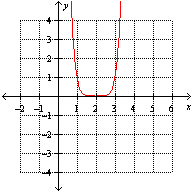
B)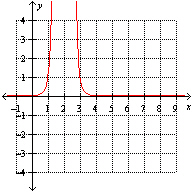
C)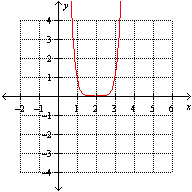
D)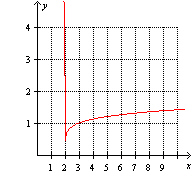
E) None of these options
 ?
?A)

B)

C)

D)

E) None of these options

Unlock Deck
Unlock for access to all 71 flashcards in this deck.
Unlock Deck
k this deck
31
Suppose that  is directly proportional to the 5th root of
is directly proportional to the 5th root of  . If
. If  when
when  , find the proportionality constant. Round to the nearest hundredth.
, find the proportionality constant. Round to the nearest hundredth.
A)
B)
C)
D)
E)
 is directly proportional to the 5th root of
is directly proportional to the 5th root of  . If
. If  when
when  , find the proportionality constant. Round to the nearest hundredth.
, find the proportionality constant. Round to the nearest hundredth.A)

B)

C)

D)

E)


Unlock Deck
Unlock for access to all 71 flashcards in this deck.
Unlock Deck
k this deck
32
Let  and
and  . Find
. Find  .
.
A) -4
B) -14
C)
D) -1
E) 45
 and
and  . Find
. Find  .
.A) -4
B) -14
C)

D) -1
E) 45

Unlock Deck
Unlock for access to all 71 flashcards in this deck.
Unlock Deck
k this deck
33
Which one of the following graphs represents the function  ?
?
A)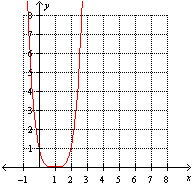
B)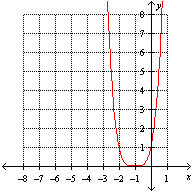
C)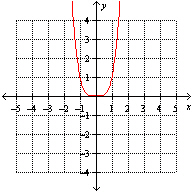
D)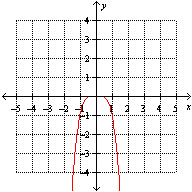
E)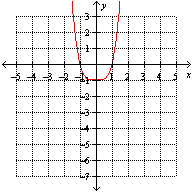
 ?
?A)

B)

C)

D)

E)


Unlock Deck
Unlock for access to all 71 flashcards in this deck.
Unlock Deck
k this deck
34
Which one of the following is the graph of  ?
?
A)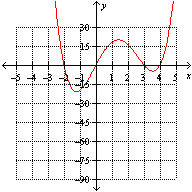
B)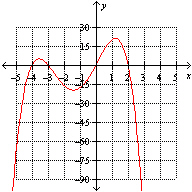
C) None of these options
D)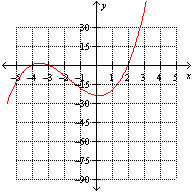
E)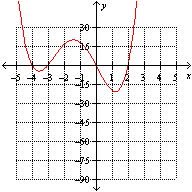
 ?
?A)

B)

C) None of these options
D)

E)


Unlock Deck
Unlock for access to all 71 flashcards in this deck.
Unlock Deck
k this deck
35
Let  and
and  . Find
. Find  .
.
A)
B) 4
C)
D) 12
E) -8
 and
and  . Find
. Find  .
.A)

B) 4
C)

D) 12
E) -8

Unlock Deck
Unlock for access to all 71 flashcards in this deck.
Unlock Deck
k this deck
36
Which one of the following is the graph of  .
.
A)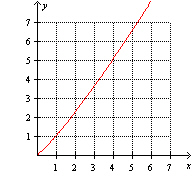
B) None of these options
C)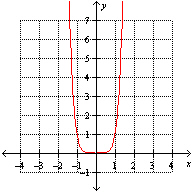
D)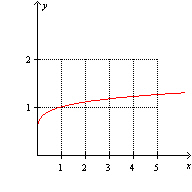
E)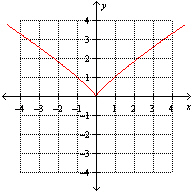
 .
.A)

B) None of these options
C)

D)

E)


Unlock Deck
Unlock for access to all 71 flashcards in this deck.
Unlock Deck
k this deck
37
Which one of the following is a graph of the function  ?
?
A)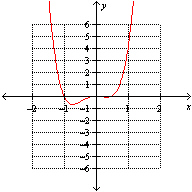
B)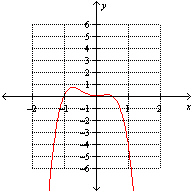
C) None of these options
D)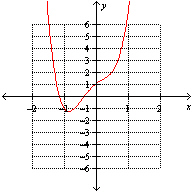
E)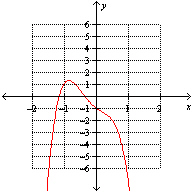
 ?
?A)

B)

C) None of these options
D)

E)


Unlock Deck
Unlock for access to all 71 flashcards in this deck.
Unlock Deck
k this deck
38
Express the polynomial function  in complete factored form.
in complete factored form.
A)
B)
C)
D)
E)
 in complete factored form.
in complete factored form.A)

B)

C)

D)

E)


Unlock Deck
Unlock for access to all 71 flashcards in this deck.
Unlock Deck
k this deck
39
The power  of a jet of water from a fire hose that is 3 inches in diameter is directly proportional to the cube of the water velocity
of a jet of water from a fire hose that is 3 inches in diameter is directly proportional to the cube of the water velocity  . If the velocity is divided by 4, by what factor will the power decrease?
. If the velocity is divided by 4, by what factor will the power decrease?
A)
B)
C) 64
D)
E) 4
 of a jet of water from a fire hose that is 3 inches in diameter is directly proportional to the cube of the water velocity
of a jet of water from a fire hose that is 3 inches in diameter is directly proportional to the cube of the water velocity  . If the velocity is divided by 4, by what factor will the power decrease?
. If the velocity is divided by 4, by what factor will the power decrease?A)

B)

C) 64
D)

E) 4

Unlock Deck
Unlock for access to all 71 flashcards in this deck.
Unlock Deck
k this deck
40
The graphs of  and
and  are given below. Which one of the following is the graph of
are given below. Which one of the following is the graph of  ?
? 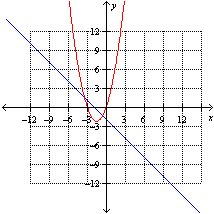
A)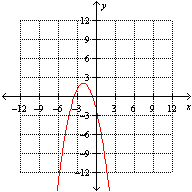
B)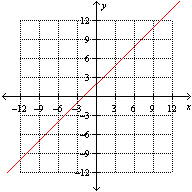
C)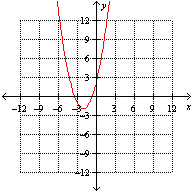
D)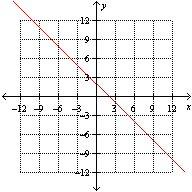
E)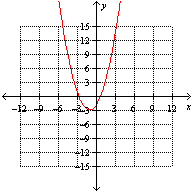
 and
and  are given below. Which one of the following is the graph of
are given below. Which one of the following is the graph of  ?
? 
A)

B)

C)

D)

E)


Unlock Deck
Unlock for access to all 71 flashcards in this deck.
Unlock Deck
k this deck
41
The data in the table shows the temperature for a cup of coffee after it is poured into the cup. The initial temperature of the coffee is F. Which one of the following functions is the best model for this data? 
A)
B)
C) None of these options
D)
E)

A)

B)

C) None of these options
D)

E)


Unlock Deck
Unlock for access to all 71 flashcards in this deck.
Unlock Deck
k this deck
42
The mouse population in a small desert area is modeled by the function  where
where  is measured in days. When will the mouse population disappear?
is measured in days. When will the mouse population disappear?
A) After 3 days
B) After 58 days
C) After 411 days
D) After 1320 days
E) After 11 days
 where
where  is measured in days. When will the mouse population disappear?
is measured in days. When will the mouse population disappear?A) After 3 days
B) After 58 days
C) After 411 days
D) After 1320 days
E) After 11 days

Unlock Deck
Unlock for access to all 71 flashcards in this deck.
Unlock Deck
k this deck
43
The loudness  of a sound (measured in decibels dB) is inversely proportional to the square of the distance
of a sound (measured in decibels dB) is inversely proportional to the square of the distance  from the source of the sound. Suppose a person who is 4 ft from a hair dryer experiences a sound level of 60 dB. How loud is the hair dryer for a person 7 ft away? Round to the nearest tenth.
from the source of the sound. Suppose a person who is 4 ft from a hair dryer experiences a sound level of 60 dB. How loud is the hair dryer for a person 7 ft away? Round to the nearest tenth.
A) 0.1 dB
B) 19.6 dB
C) 1.2 dB
D) 70.0 dB
E) 960.0 dB
 of a sound (measured in decibels dB) is inversely proportional to the square of the distance
of a sound (measured in decibels dB) is inversely proportional to the square of the distance  from the source of the sound. Suppose a person who is 4 ft from a hair dryer experiences a sound level of 60 dB. How loud is the hair dryer for a person 7 ft away? Round to the nearest tenth.
from the source of the sound. Suppose a person who is 4 ft from a hair dryer experiences a sound level of 60 dB. How loud is the hair dryer for a person 7 ft away? Round to the nearest tenth.A) 0.1 dB
B) 19.6 dB
C) 1.2 dB
D) 70.0 dB
E) 960.0 dB

Unlock Deck
Unlock for access to all 71 flashcards in this deck.
Unlock Deck
k this deck
44
A cardboard box has a square base, with each edge of the base having length  inches, as shown in the figure. The volume of the box is determined by the function
inches, as shown in the figure. The volume of the box is determined by the function  . What is the domain of
. What is the domain of  in the context of this problem?
in the context of this problem? 
A)
B)
C)
D)
E)
 inches, as shown in the figure. The volume of the box is determined by the function
inches, as shown in the figure. The volume of the box is determined by the function  . What is the domain of
. What is the domain of  in the context of this problem?
in the context of this problem? 
A)

B)

C)

D)

E)


Unlock Deck
Unlock for access to all 71 flashcards in this deck.
Unlock Deck
k this deck
45
Suppose that  is inversely proportional to the square of
is inversely proportional to the square of  . If
. If  when
when  , find the proportionality constant. Round to the nearest hundredth.
, find the proportionality constant. Round to the nearest hundredth.
A)
B)
C)
D)
E)
 is inversely proportional to the square of
is inversely proportional to the square of  . If
. If  when
when  , find the proportionality constant. Round to the nearest hundredth.
, find the proportionality constant. Round to the nearest hundredth.A)

B)

C)

D)

E)


Unlock Deck
Unlock for access to all 71 flashcards in this deck.
Unlock Deck
k this deck
46
Which one of the following is the equation of the horizontal asymptote for  ?
?
A)
B)
C)
D)
E)
 ?
?A)

B)

C)

D)

E)


Unlock Deck
Unlock for access to all 71 flashcards in this deck.
Unlock Deck
k this deck
47
Which one of the following is the equation of the vertical asymptote for  ?
?
A)
B)
C)
D)
E)
 ?
?A)

B)

C)

D)

E)


Unlock Deck
Unlock for access to all 71 flashcards in this deck.
Unlock Deck
k this deck
48
Find an appropriate model for the data provided in the table. Round to the nearest thousandth. 
A)
B)
C)
D)
E)

A)

B)

C)

D)

E)


Unlock Deck
Unlock for access to all 71 flashcards in this deck.
Unlock Deck
k this deck
49
Determine the end behavior of the function  .
.
A) As and
and  .
.
B) As and
and  .
.
C) As and
and  .
.
D) As and
and  .
.
E) As and
and  .
.
 .
.A) As
 and
and  .
.B) As
 and
and  .
.C) As
 and
and  .
.D) As
 and
and  .
.E) As
 and
and  .
.
Unlock Deck
Unlock for access to all 71 flashcards in this deck.
Unlock Deck
k this deck
50
Suppose that  is inversely proportional to the square of
is inversely proportional to the square of  . Which one of the following is an equation that expresses this statement?
. Which one of the following is an equation that expresses this statement?
A)
B)
C)
D)
E)
 is inversely proportional to the square of
is inversely proportional to the square of  . Which one of the following is an equation that expresses this statement?
. Which one of the following is an equation that expresses this statement?A)

B)

C)

D)

E)


Unlock Deck
Unlock for access to all 71 flashcards in this deck.
Unlock Deck
k this deck
51
Suppose that  is inversely proportional to the cube root of
is inversely proportional to the cube root of  . Which one of the following is an equation that expresses this statement?
. Which one of the following is an equation that expresses this statement?
A)
B)
C)
D)
E)
 is inversely proportional to the cube root of
is inversely proportional to the cube root of  . Which one of the following is an equation that expresses this statement?
. Which one of the following is an equation that expresses this statement?A)

B)

C)

D)

E)


Unlock Deck
Unlock for access to all 71 flashcards in this deck.
Unlock Deck
k this deck
52
Which one of the following is the graph of  .
.
A)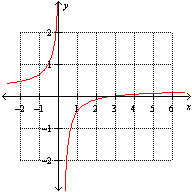
B)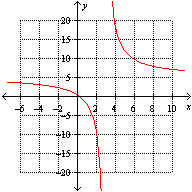
C) None of these options
D)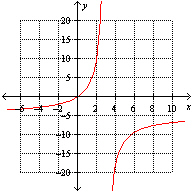
E)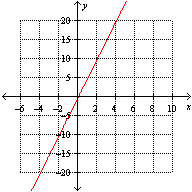
 .
.A)

B)

C) None of these options
D)

E)


Unlock Deck
Unlock for access to all 71 flashcards in this deck.
Unlock Deck
k this deck
53
Determine the end behavior of the function  .
.
A) As and
and  .
.
B) As and
and  .
.
C) As and
and  .
.
D) As and
and  .
.
E) As and
and  .
.
 .
.A) As
 and
and  .
.B) As
 and
and  .
.C) As
 and
and  .
.D) As
 and
and  .
.E) As
 and
and  .
.
Unlock Deck
Unlock for access to all 71 flashcards in this deck.
Unlock Deck
k this deck
54
The loudness  of a sound (measured in decibels dB) is inversely proportional to the square of the distance
of a sound (measured in decibels dB) is inversely proportional to the square of the distance  from the source of the sound. Suppose a person who is 3 ft from a hair dryer experiences a sound level of 75 dB. Find the proportionality constant and write the equation that expresses the inverse proportionality.
from the source of the sound. Suppose a person who is 3 ft from a hair dryer experiences a sound level of 75 dB. Find the proportionality constant and write the equation that expresses the inverse proportionality.
A)
B)
C)
D)
E)
 of a sound (measured in decibels dB) is inversely proportional to the square of the distance
of a sound (measured in decibels dB) is inversely proportional to the square of the distance  from the source of the sound. Suppose a person who is 3 ft from a hair dryer experiences a sound level of 75 dB. Find the proportionality constant and write the equation that expresses the inverse proportionality.
from the source of the sound. Suppose a person who is 3 ft from a hair dryer experiences a sound level of 75 dB. Find the proportionality constant and write the equation that expresses the inverse proportionality.A)

B)

C)

D)

E)


Unlock Deck
Unlock for access to all 71 flashcards in this deck.
Unlock Deck
k this deck
55
Determine the end behavior of the function  as
as  .
.
A) As .
.
B) As .
.
C) As .
.
D) As .
.
E) As .
.
 as
as  .
.A) As
 .
.B) As
 .
.C) As
 .
.D) As
 .
.E) As
 .
.
Unlock Deck
Unlock for access to all 71 flashcards in this deck.
Unlock Deck
k this deck
56
Determine the behavior of the function  as
as  .
.
A) As ,
,  .
.
B) As ,
,  .
.
C) As ,
,  .
.
D) As ,
,  .
.
E) As ,
,  .
.
 as
as  .
.A) As
 ,
,  .
.B) As
 ,
,  .
.C) As
 ,
,  .
.D) As
 ,
,  .
.E) As
 ,
,  .
.
Unlock Deck
Unlock for access to all 71 flashcards in this deck.
Unlock Deck
k this deck
57
Which one of the following functions best models the data given in the table below. 
A) Exponential
B) Power
C) Quadratic
D) Linear
E) None of these options

A) Exponential
B) Power
C) Quadratic
D) Linear
E) None of these options

Unlock Deck
Unlock for access to all 71 flashcards in this deck.
Unlock Deck
k this deck
58
Determine the end behavior of the function  .
.
A) As and as
and as  .
.
B) As and as
and as  .
.
C) As and as
and as  .
.
D) As and as
and as  .
.
E) As and as
and as  .
.
 .
.A) As
 and as
and as  .
.B) As
 and as
and as  .
.C) As
 and as
and as  .
.D) As
 and as
and as  .
.E) As
 and as
and as  .
.
Unlock Deck
Unlock for access to all 71 flashcards in this deck.
Unlock Deck
k this deck
59
Suppose that  is inversely proportional to the cube root of
is inversely proportional to the cube root of  . If
. If  when
when  , find the proportionality constant. Round to the nearest hundredth.
, find the proportionality constant. Round to the nearest hundredth.
A)
B)
C)
D)
E)
 is inversely proportional to the cube root of
is inversely proportional to the cube root of  . If
. If  when
when  , find the proportionality constant. Round to the nearest hundredth.
, find the proportionality constant. Round to the nearest hundredth.A)

B)

C)

D)

E)


Unlock Deck
Unlock for access to all 71 flashcards in this deck.
Unlock Deck
k this deck
60
Which one of the following is the graph of  ?
?
A)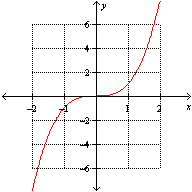
B)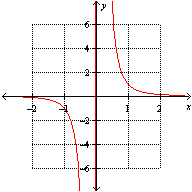
C) None of these options
D)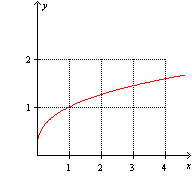
E)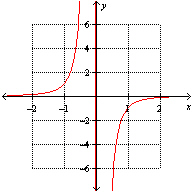
 ?
?A)

B)

C) None of these options
D)

E)


Unlock Deck
Unlock for access to all 71 flashcards in this deck.
Unlock Deck
k this deck
61
Find the equation(s) of the vertical asymptote(s) of  .
.
A)

B)
 and
and 

C)

D)
 and
and 

E)
 and
and 

 .
.A)


B)

 and
and 

C)


D)

 and
and 

E)

 and
and 


Unlock Deck
Unlock for access to all 71 flashcards in this deck.
Unlock Deck
k this deck
62
The graph of a rational function is given. Determine the equation(s) of the vertical asymptote(s). 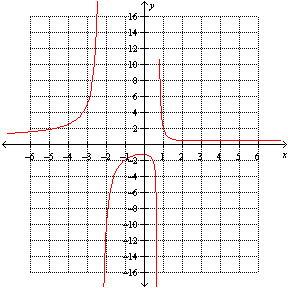
A)
 and
and 

B)
C)
D)
 and
and 

E) There are no vertical asymptotes.

A)

 and
and 

B)

C)

D)

 and
and 

E) There are no vertical asymptotes.

Unlock Deck
Unlock for access to all 71 flashcards in this deck.
Unlock Deck
k this deck
63
Determine the end behavior of  .
.
A) As and as
and as  .
.
B) As
 and as
and as 
 .
.
C) As and as
and as 
 .
.
D) As and as
and as  .
.
E) As
 and as
and as  .
.
 .
.A) As
 and as
and as  .
.B) As

 and as
and as 
 .
.C) As
 and as
and as 
 .
.D) As
 and as
and as  .
.E) As

 and as
and as  .
.
Unlock Deck
Unlock for access to all 71 flashcards in this deck.
Unlock Deck
k this deck
64
Find the equation of the horizontal asymptote of  .
.
A)

B) 3
3
C)

D)

E)

 .
.A)


B)
 3
3C)


D)


E)



Unlock Deck
Unlock for access to all 71 flashcards in this deck.
Unlock Deck
k this deck
65
Find the equation of the horizontal asymptote for  .
.
A)

B)

C)
D)

E)

 .
.A)


B)


C)

D)


E)



Unlock Deck
Unlock for access to all 71 flashcards in this deck.
Unlock Deck
k this deck
66
The function  is graphed below. Determine the x - and y -intercepts.
is graphed below. Determine the x - and y -intercepts. 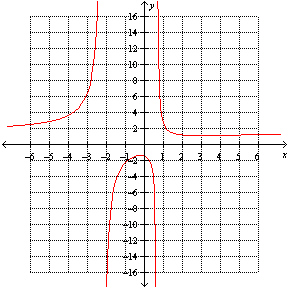
A) The x -intercept is ; the y -intercept is
; the y -intercept is  .
.
B) There are no x -intercepts; the y -intercept is (0, ).
).
C) There are no x -intercepts; there is no y -intercept.
D) The x -intercept is (0, ); there is no y -intercept.
); there is no y -intercept.
E) The x -intercepts are (0, ) and (0,
) and (0,  ); the y -intercept is (0,
); the y -intercept is (0,  ).
).
 is graphed below. Determine the x - and y -intercepts.
is graphed below. Determine the x - and y -intercepts. 
A) The x -intercept is
 ; the y -intercept is
; the y -intercept is  .
.B) There are no x -intercepts; the y -intercept is (0,
 ).
).C) There are no x -intercepts; there is no y -intercept.
D) The x -intercept is (0,
 ); there is no y -intercept.
); there is no y -intercept.E) The x -intercepts are (0,
 ) and (0,
) and (0,  ); the y -intercept is (0,
); the y -intercept is (0,  ).
).
Unlock Deck
Unlock for access to all 71 flashcards in this deck.
Unlock Deck
k this deck
67
Determine the behavior of  as
as  .
.
A) As .
.
B) As .
.
C) As .
.
D) As .
.
E) As .
.
 as
as  .
.A) As
 .
.B) As
 .
.C) As
 .
.D) As
 .
.E) As
 .
.
Unlock Deck
Unlock for access to all 71 flashcards in this deck.
Unlock Deck
k this deck
68
Find the x -intercept(s) of  .
.
A) ( , 0)
, 0)
B) ( , 0)
, 0)
C)
D) ( , 0)
, 0)
E) ( , 0)
, 0)
 .
.A) (
 , 0)
, 0)B) (
 , 0)
, 0)C)

D) (
 , 0)
, 0)E) (
 , 0)
, 0)
Unlock Deck
Unlock for access to all 71 flashcards in this deck.
Unlock Deck
k this deck
69
Find the y -intercept of  .
.
A) (0, )
)
B)
C) (0, )
)
D) (0, )
)
E) (0, )
)
 .
.A) (0,
 )
)B)

C) (0,
 )
)D) (0,
 )
)E) (0,
 )
)
Unlock Deck
Unlock for access to all 71 flashcards in this deck.
Unlock Deck
k this deck
70
Suppose a rocket is fired upward from the surface of the earth with an initial velocity  (measured in m/s). Then the maximum height
(measured in m/s). Then the maximum height  (in meters) reached by the rocket is given by the function
(in meters) reached by the rocket is given by the function  where the radius of the earth
where the radius of the earth  is
is  meters and the acceleration due to gravity
meters and the acceleration due to gravity  is 9.8
is 9.8  . If the initial velocity of the rocket is 9100 m/s, what is the maximum height reached by the rocket?
. If the initial velocity of the rocket is 9100 m/s, what is the maximum height reached by the rocket?
A) meters
meters
B) 5.26e+14 meters
C) -7.86e+07 meters
D) 1.26e+07 meters
E) 6.35 meters
 (measured in m/s). Then the maximum height
(measured in m/s). Then the maximum height  (in meters) reached by the rocket is given by the function
(in meters) reached by the rocket is given by the function  where the radius of the earth
where the radius of the earth  is
is  meters and the acceleration due to gravity
meters and the acceleration due to gravity  is 9.8
is 9.8  . If the initial velocity of the rocket is 9100 m/s, what is the maximum height reached by the rocket?
. If the initial velocity of the rocket is 9100 m/s, what is the maximum height reached by the rocket?A)
 meters
metersB) 5.26e+14 meters
C) -7.86e+07 meters
D) 1.26e+07 meters
E) 6.35 meters

Unlock Deck
Unlock for access to all 71 flashcards in this deck.
Unlock Deck
k this deck
71
Find the equation of the vertical asymptote for  .
.
A)
B)
C)

D)

E)
 .
.A)

B)

C)


D)


E)


Unlock Deck
Unlock for access to all 71 flashcards in this deck.
Unlock Deck
k this deck



